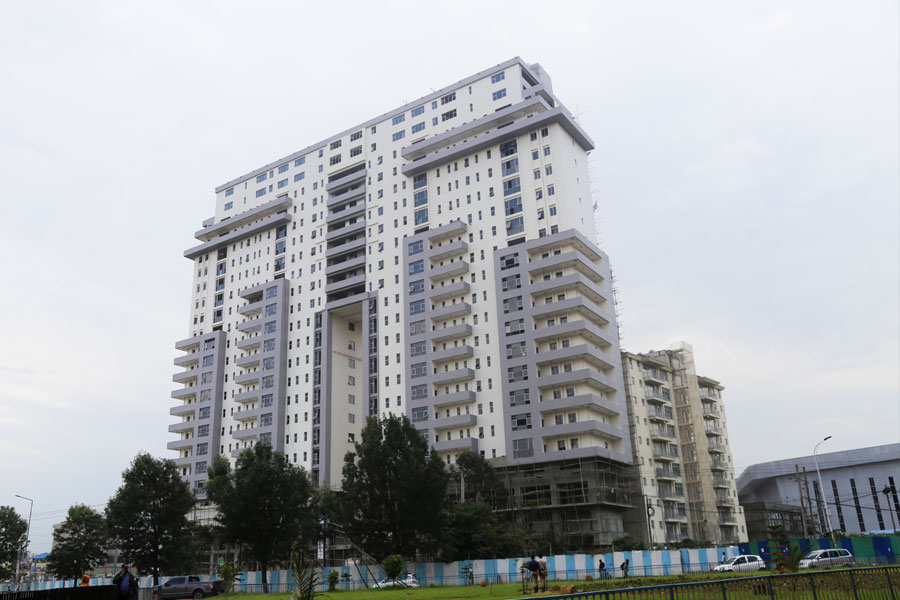
Fortune News | Jun 10,2023
The lofty ambitions of former Deputy Mayor Takele Uma to safeguard Addis Abeba’s most vulnerable residents from rampant inflation are at risk of crumbling, facing an acute wheat shortage that has brought an industrial bakery to a standstill for over a month.
An audacious project spearheaded by Takele, the Sheger Bread & Flour Factory was designed to provide low-cost bread to those affected by the soaring cost of living. The plant, nestled within the manufacturing arm of the Midroc Investment Group, found itself struggling to maintain production as the price of wheat surged. Both the Group and the Mayor’s Office stepped up to the plate, providing subsidies of 0.36 Br and 1.14 Br for a loaf, respectively, to maintain production levels in an environment of price escalation.
Operating from a sprawling 4.1hct facility in the Aqaqi-Qality District, the bakery was constructed for 900 million Br. It is capable of churning out 1.6 million loaves of bread a day. The plant, a feather in the cap of the MIDROC’s Horizon Plantations Plc, had been sustaining its production by buying wheat at around 3,000 Br of a quintal supplied by the city’s Trade Bureau. However, the sudden leap to 5,000 Br a quintal caused tremors in its operations, forcing its managers to pass on the increased cost to consumers, according to Seid Mohammed, the head of MIDROC’s corporate communication.
“We transferred the additional cost to the consumers,” Seid from MIDRIC told Fortune.
The situation escalated when the Trade Bureau failed to meet the bakery’s wheat demands, suspending production entirely and leaving a workforce of 390 idle. Seid noted that these workers were temporarily reassigned to other areas of the Group’s business while the plant sought to acquire 100,000qtl of wheat through a bidding process to resume production.
Sheger’s parent company, the Midroc Investment Group, is owned by Mohammed Hussein Al-Amoudi’s (Sheikh) family. It has business interests across various sectors and industries, including agriculture, manufacturing, mining, construction, and hospitality. Over the last 25 years, the Group has built a formidable presence in Ethiopia, with Sheger representing its contribution to corporate social responsibility. The plant is one of 11 bakeries established across the regional states recently.
Bereket Tekle from the Addis Abeba City Administration’s Mayor Office Press Secretariat confirms that the closure of the bread shops is due to a wheat supply shortage but admits a lack of details. Mayor Adanech Abiebie announced an allocation of 300 million Br to tackle the problem while addressing the City Council that met recently.
“There is a need to work hard to address the challenges that persist in the wheat supply,” she told councillors.
The federal government’s belief in Ethiopia’s self-sufficiency in wheat production has led to a termination in imports despite the harvested wheat for 2022 falling significantly short of the country’s annual demand of 97 million quintals. Data from the Central Statistics Agency reveals that 52.1 million quintals of wheat were harvested from 1.6 million hectares of land during the Meher season.
The decision to stop imports has been met with scepticism, with officials from the Addis Abeba Trade Bureau suggesting it merely diverts the attention from the central issue rather than addressing it. Biniyam Alemayhu, the head of the Bureau, said that they previously sourced supplies through the Ministry of Trade & Regional Integration (MTRI) until the focus shifted to local production.
The Bureau used to supply around 30,000qtl of wheat a month to the bakery that demands 1,200qtl of flour daily. While Biniyam does not acknowledge the shortage of bread in the city, he believes there is enough domestic production to supply bakeries.
“They’ll buy from the local market,” said Biniyam.
He lauded providing additional 25 bakeries throughout the city, with 16 expected to start operation and produce 1.2 million bread loaves a day.
“This is what we can do,” Biniyam told Fortune. “After all, the city is not a producer but a consumer.”
While Biniyam remains optimistic about the domestic production capacity, many plant owners and experts are concerned about the looming wheat shortage.
One such company is the Sun Flour Factory in Debre Brehan, in northern Shoa of the Amhara Regional State, sourcing wheat from farmers in the Bale and Gojam zones in Oromia and Amhara regional states. The company was forced to slash its production capacity by two-thirds. Its manager, Mohammed Ahmed, shares tales of a substantial price hike in wheat, from 3,000 Br a few months ago to 5,000 Br, a cost increase that was inevitably passed on to consumers, with flour shooting from 4,000 Br to 7,000 Br.
“We’re working hard not to shut down the factory,” Mohammed told Fortune.
While Ethiopia grapples with its wheat scarcity, its most vulnerable citizens bear the brunt of the crisis. As factories cease operation and prices surge, the question remains is how much longer consumers can weather the storm, experts contemplate.
Matiwos Ensermu (PhD), an associate professor teaching logistics & supply chain management at Addis Abeba University, believes enhancing farmers’ capacity and equipping them with technology is the most sustainable solution. However, the inconsistent production at the Sheger Bread factory suggests that more comprehensive analysis and changes might be needed, according to Matiwos.
Farmers, too, are feeling the pinch, with a decrease in output resulting from a fertiliser shortage.
Getnet Aschale, a farmer from the east Gojam Zone in the Amhara Regional State, reveals that his production has halved from 60qtl from his six plots (two blocks short of a hectare), raising concerns about the months ahead.
He built a house and provided for his four children after selling a quintal of wheat for 5,000 Br; he was satisfied even after splitting it with the land owner.
“Wheat changed my life,” he said.
The supply chain hiccup has hit the Sheger Bread operation hard. At its peak, the factory distributed bread through 20 vehicles to over 400 repurposed Anbessa buses serving as outlets in 120 weredas in two shifts; early morning and afternoon. However, with production halved and then stopped altogether, Biruk Eskal, 28, a manager at a Sheger Bread outlet in Lafto, said they had to switch to selling tea and coffee to stay afloat.
Biruk and his associates received the shop from the Wereda as an enterprise association and have worked there for three years. Along with four associates, Biruk gained 0.30 Br from each loaf, although it fluctuated upon the delivered number. He noticed that the quantity of bread supply decreased over time with growing prices.
He cites the agreement to get a minimum of 4,000 bread loaves daily, dwindling to 2,400 pieces for the past four months. With the reduced supply by half, the bread was capped at nine pieces before closing it down. At its prime, an 80gm bread was sold for 1.20 Br while a 20-piece cap was put for a person. However, the economic woes that gripped the country amidst a wheat export narrative lauded by the federal government have not been on its side.
After sporadic operation for the past three years, the price has jumped to 4.80 Br during its last days, cornering the very customers it was aimed to serve who say that a declining quality accompanied the price hike while equivalent volume but elevated loaf sold for six Birr in the local shops.
A stark example of Sheger’s struggles is evident in the story of Tigist Kassa, a single mother of three residing in Ayer Tena of Kolfe Qeranio District. A sole provider of her family, she earns about 3,000 Br a month. As prices rose, she was forced to reduce the bread she bought for her family from 14 loaves twice a day to 10. When production at Sheger Bread halted, she turned to baking bread at home using wheat given to her by relatives.
“Only God knows what happens after,” she said.
PUBLISHED ON
Jul 22,2023 [ VOL
24 , NO
1212]

Fortune News | Jun 10,2023

Radar | Jan 26,2019

Sunday with Eden | Jun 25,2022

Radar |

Verbatim | Aug 13,2022

Radar | Oct 12,2019

Life Matters | Oct 08,2022

Exclusive Interviews | Dec 12,2020

Editorial | Dec 19,2020

Radar | Mar 02,2024

Dec 22 , 2024 . By TIZITA SHEWAFERAW
Charged with transforming colossal state-owned enterprises into modern and competitiv...

Aug 18 , 2024 . By AKSAH ITALO
Although predictable Yonas Zerihun's job in the ride-hailing service is not immune to...

Jul 28 , 2024 . By TIZITA SHEWAFERAW
Unhabitual, perhaps too many, Samuel Gebreyohannes, 38, used to occasionally enjoy a couple of beers at breakfast. However, he recently swit...

Jul 13 , 2024 . By AKSAH ITALO
Investors who rely on tractors, trucks, and field vehicles for commuting, transporting commodities, and f...

Oct 18 , 2025
The political establishment, notably the ruling party and its top brass, has become p...

Oct 11 , 2025
Ladislas Farago, a roving Associated Press (AP) correspondent, arrived in Ethiopia in...

Oct 4 , 2025
Eyob Tekalegn (PhD) had been in the Governor's chair for only weeks when, on Septembe...

Sep 27 , 2025
Four years into an experiment with “shock therapy” in education, the national moo...